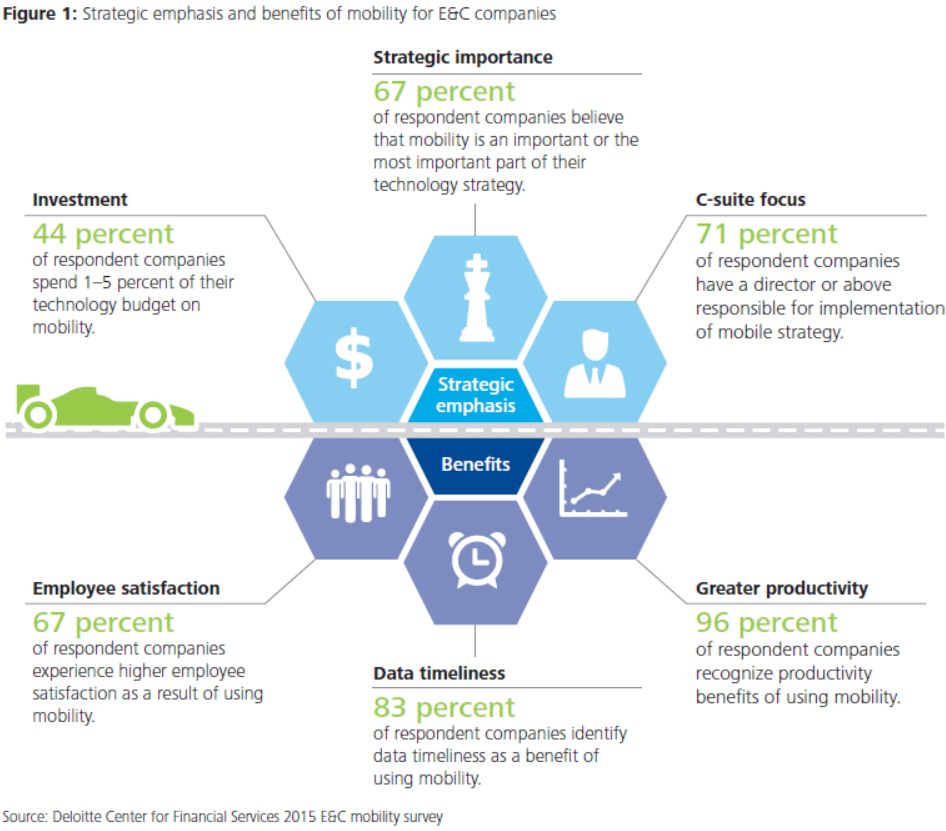While the concept of mobility for design and construction is far from new, we here at Tango are witnessing an undeniable shift within our customer base when it comes to the pace of adoption and the strategic lens through which store development professionals are viewing mobility.
Connectivity in Engineering and Construction
Let’s start with some macro statistics for mobility.
- Global mobile connections are likely to reach 9.5 billion in 2019, compared to approximately 6.9 billion in 2014.
- North America has the highest percent of 4G coverage – 97 percent – when compared to other regions[2].
- In developed countries, mobile internet subscriber penetration is expected to reach 70% by 2020, up from 60 percent in 2014.
The next logical question in this context is, how has the deep penetration of mobility trickled down to the job site? Deloitte recently published a paper, Engineering and Construction Companies – Cracking the Collaboration Code with Mobility which addresses that question head on. The Deloitte survey looked at 48 engineering and construction (E&C) companies of varying size in an effort to “assess their mobility usage patterns, with a focus on its strategic importance, current and future usage, benefits, and adoption challenges.” The results of the survey can be summed up in the two graphics below.
In Figure 1 the message is clear, for E&C companies mobility is strategically important, increases productivity, and most notably improves data timeliness.

Equally clear, as illustrated in Figure 2, is that E&C companies coalesce into one of three groups based on their depth of mobile usage. These three groups form a nice bell curve of mobile usage, with Skeptics, Rationalists, and Enthusiasts representing 25%, 50% and 25%, respectively.

Top 5 Store Development Opportunities for Mobile – at Least Today…
The use cases for mobility in store development are too numerous to list in this post – and let’s be honest – many have been on the list for a long time with little traction in the field. At Tango we’ve had the opportunity to work with hundreds of retail and restaurant companies. Today our software manages more than 200,000 locations across more than a hundred countries. So what’s really happening at the job site? Below are the top 5 opportunities we’ve seen across our customer base that have provided tangible value. Note, these are in no particular order.
- Real Estate Market Rides, Site Visits and Deal Making
- Project Management – Scheduling/Budgeting/Documents/COs/Invoices
- Scorecarding
- Maintenance Service Requests & Work Orders
- Facilities Assessments
While each of the above opportunities could constitute a blog post in and of itself, I’d like to focus on two that are emerging and how specific customers are seeing value – #1 Real Estate and #3 Scorecarding.
Real Estate
Effective Deal Makers spend the majority of their time in the field prospecting new locations and closing deals. Let’s look at how one of Tango’s customers, Dunkin’ Brands, leverages our platform to win the race for space by reducing friction in the site selection and deal approval process.
We provide Dunkin’s field real estate personnel with a mobile application to assist in the assessment of markets, targeted trade areas and sites – at scale. Dunkin uses the application to assess 2,000 plus sites and run 3,000 plus sales forecast models, and ultimately opens more than 500 stores a year. The application allows you to pick sites, projects or stores and generate an optimized trip plan with directions and maps from site to site. Deal Makers can quickly drop a pin for a potential site on a map, visualize demographics, complete a site survey, run sales forecast, take photos, etc.
Performing these tasks in a mobile environment in the field speeds deal flow, and thus competitiveness for the best real estate, and allows deal makers to invest their time into the right sites. Having in-field access to market, target, site, project, competitive and store information at the tip of their fingers – in a map-enabled environment – means Dunkin’ Brands has a clear advantage.
Scorecarding
Scorecarding is a broad capability that can be applied to many use cases across the store development lifecycle. Let’s zoom in on one such case where Tango’s customer YUM! Brands – KFC, Taco Bell and Pizza Hut – is starting to see value on a global scale.
YUM! Brands has over 44,000 restaurants world-wide, the vast majority of which are franchised. So how does a company that is opening hundreds of stores across the globe each year ensure franchise and corporate restaurants adhere to brand and store design standards? Questions such as –is the Colonel sign the right size? Is the red the right red? Is the Colonel’s beard the right size? – might seem amusing, but in reality are critical to their brand and the restaurant experience YUM! is trying to deliver to customers.
To make sure brand and design standards are followed, YUM! Brands is deploying Tango’s Scorecarding application globally in 130 countries and will be conducting 3,000 plus scorecards a year for new build projects as well as remodels.
The Deloitte E&C survey and our experience developing in-field tools for Tango’s retail and restaurant customers clearly illustrate that mobility is finally picking up steam and we are only scratching the surface when it comes to mobile opportunities across the store development lifecycle. The next question becomes, are you a skeptic, rationalist, or enthusiast?
Interested in learning more about our approach to store lifecycle management?
